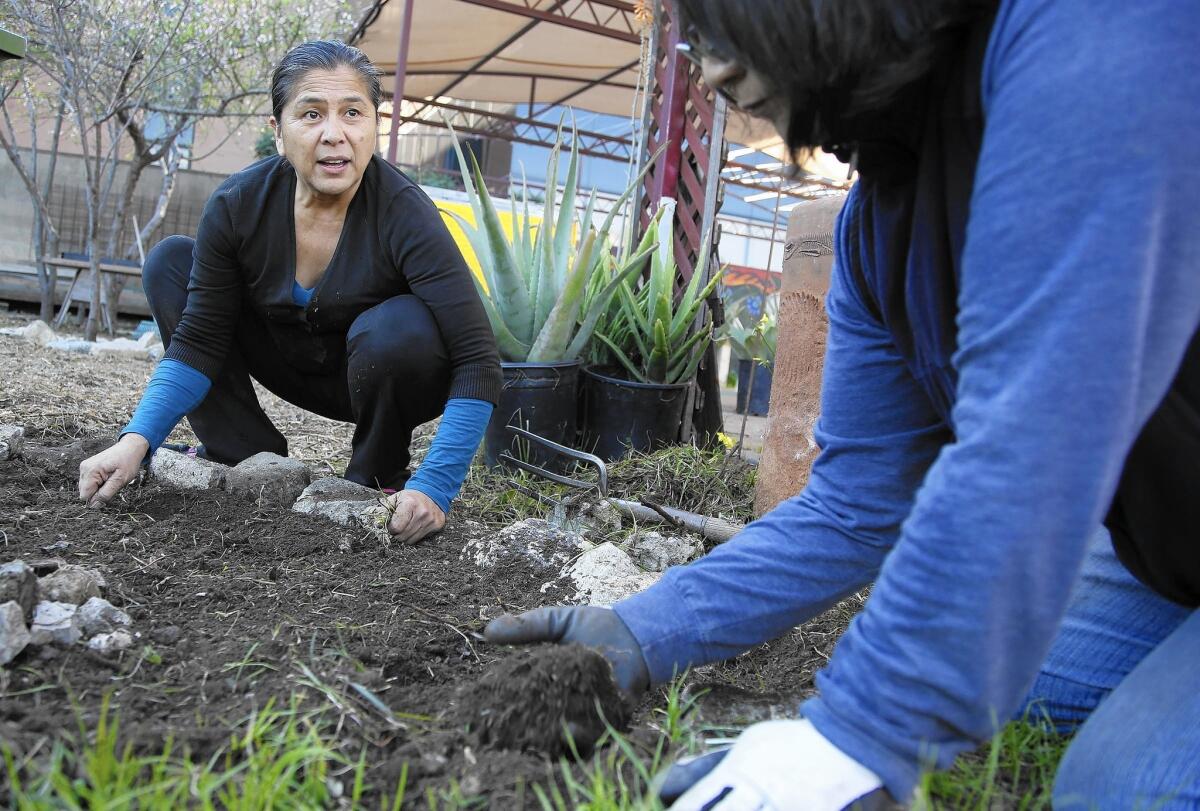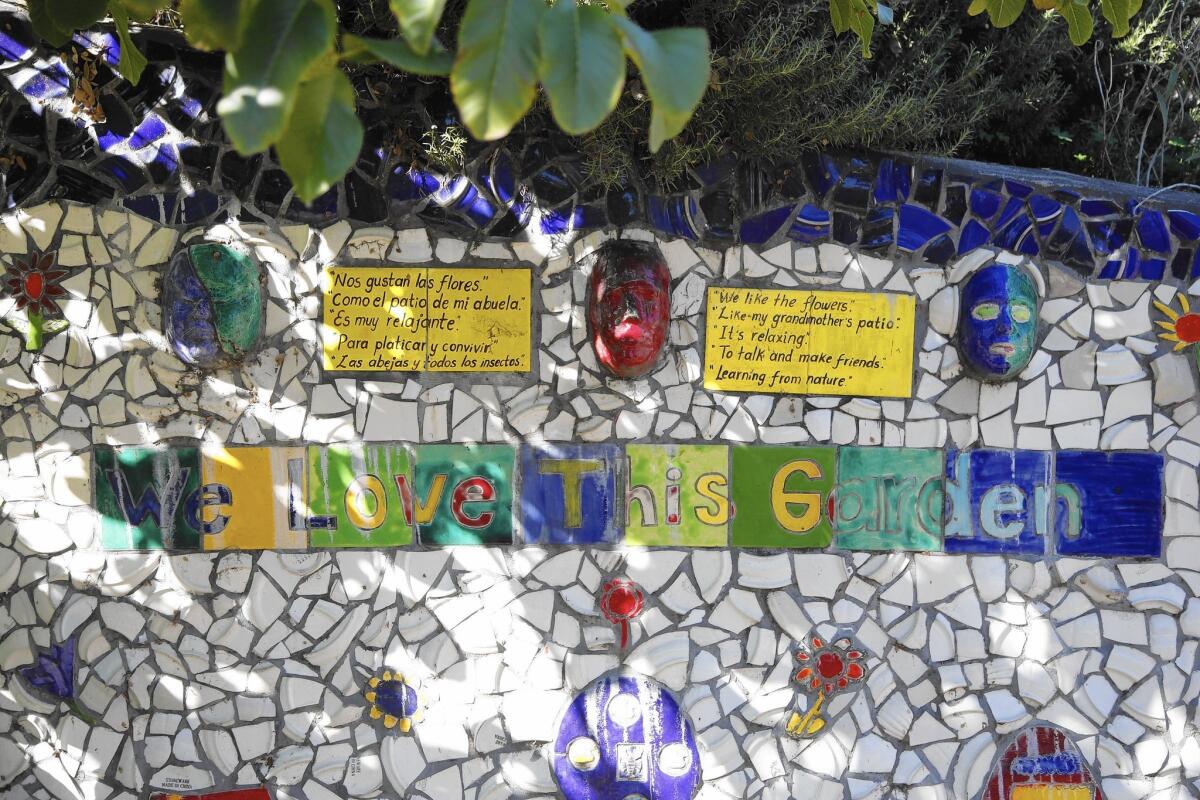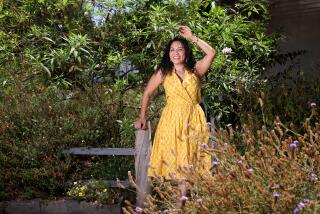Group rallies to secure stake in community garden after lease talks falter

Irene Peña, executive director of Proyecto Jardín, and Monica Okita of South Pasadena pull weeds around a fruit tree at the Boyle Heights community garden.
As they do every Saturday, Consuelo Velasco Montoya and her 5-year-old son Mountain stepped off a Boyle Heights sidewalk and walked past a tiled wall with a message welcoming them to Proyecto Jardín: “Este es un jardin para todos.” This is a garden for all.
They held hands as they walked past the beehive box they painted together and the pomegranate trees they pruned with her father. They stepped by a plot of dirt where they had planned on planting a mango tree, but now might not get the chance.
The future of the garden is uncertain after Proyecto Jardín and the property’s landlord, White Memorial Medical Center, could not agree to terms on a new lease.
On Saturday, a day before they were supposed to hand over control of the garden to the hospital, Proyecto Jardín’s supporters gathered for a rally imploring hospital officials to work with them to find a way to remain at the site.
It’s not just a garden. It’s a community treasure.
— Nancy Aragon, organizer
“It’s not just a garden,” said organizer Nancy Aragon. “It’s a community treasure.”
Hospital officials said they were worried that Proyecto Jardín volunteers hadn’t maintained the space, especially after conducting a walk-through in June when they said they found waist-high weeds.
“The state of the garden was concerning, but there was never any intent to kick out Proyecto Jardín,” said Cesar Armendariz, a hospital vice president.
The hospital later offered, and then rescinded, a six-month lease extension to see if they group could maintain the garden, Armendariz said.
But Irene Peña, the garden’s executive director, said the overgrown vegetation was a result of the garden temporarily shutting down for the winter, and that the garden was in fine shape during the summer. “There was nothing wrong,” she said.

Over the years, Proyecto Jardín has built 43 individual plots and put up tiled artwork.
She also said that the terms of the proposed lease, which would have given Proyecto Jardín access to only a third of space, were too onerous and declined to sign.
The previous lease expired Dec. 31.
Hospital officials say they plan to keep the space open to gardeners and have made preliminary arrangements with two nonprofit groups to keep the garden going.
But residents are concerned that with Proyecto Jardín out of the picture, they will lose a valuable community space where they not only grow food but hold important cultural events.
“It would be a devastating loss,” said Peter Reich, a member of IKAR, a Jewish congregation that holds joint festivals at the garden with Proyecto Jardín members.
The garden, located on Bridge Street next to the hospital, was once a vacant lot after four homes were torn down years ago, residents say. It was founded in 1999 by Dr. Robert Krochmal, a White Memorial physician.
Over the years, Proyecto Jardín has built 43 individual plots, an outhouse, a small kitchen and put up tiled artwork. Under the terms of its lease with the group’s sponsor, the nonprofit Community Partners in 2011, rent was $1 annually.
Monica Okita, who grew up next door to the garden, began working there last year because her son wanted to marry there. She and other family members replaced the canvas on a shade covering and made other repairs to prepare for the event. Now a resident of South Pasadena, she still comes by regularly to tend some of the 63 trees.
“It’s nice to work with my hands and see something tangible at the end,” said Okita on a recent morning as she pulled weeds from the base of a peach tree.
Sarah Jo Portnoy, a USC professor, has been taking students to the garden since 2011 as part of a Latino food culture course she teaches. “It’s a small example that shows how a community can be independent and provide their own food source,” she said.
Portnoy also worked with Proyecto Jardín members to obtain a $50,000 grant from USC to deliver produce to nearby residents, including those who live in the nearby Ramona Gardens housing project.
Peña said the group could lose the grant if they do not have access to the land.
Garden members have been trying to negotiate a new lease since last summer.
Armendariz said hospital officials were finalizing agreements with two nonprofit groups to continue agricultural work, although he declined to identify the potential tenants. He said the hospital would not displace anyone who is currently growing crops.
More people will have access to the space if the hospital partners with two nonprofits instead of just Proyecto Jardín, Armendariz said. “We think it will increase participation,” he said.
That will push out the long-standing community that has coalesced around the garden and limit the opportunities for children, such as her son, to contribute to it, Montoya said.
“I can’t let that happen,” she said.
Times staff writer Stephen Ceasar contributed to this story.
Twitter: @byjsong
ALSO
The story of a wife who lured an O.C. fugitive out of Iran
More Korean seniors are stepping up to donate their bodies to science
With no Trump onstage, GOP hopefuls make sounds Californians seem to like
More to Read
Sign up for Essential California
The most important California stories and recommendations in your inbox every morning.
You may occasionally receive promotional content from the Los Angeles Times.











